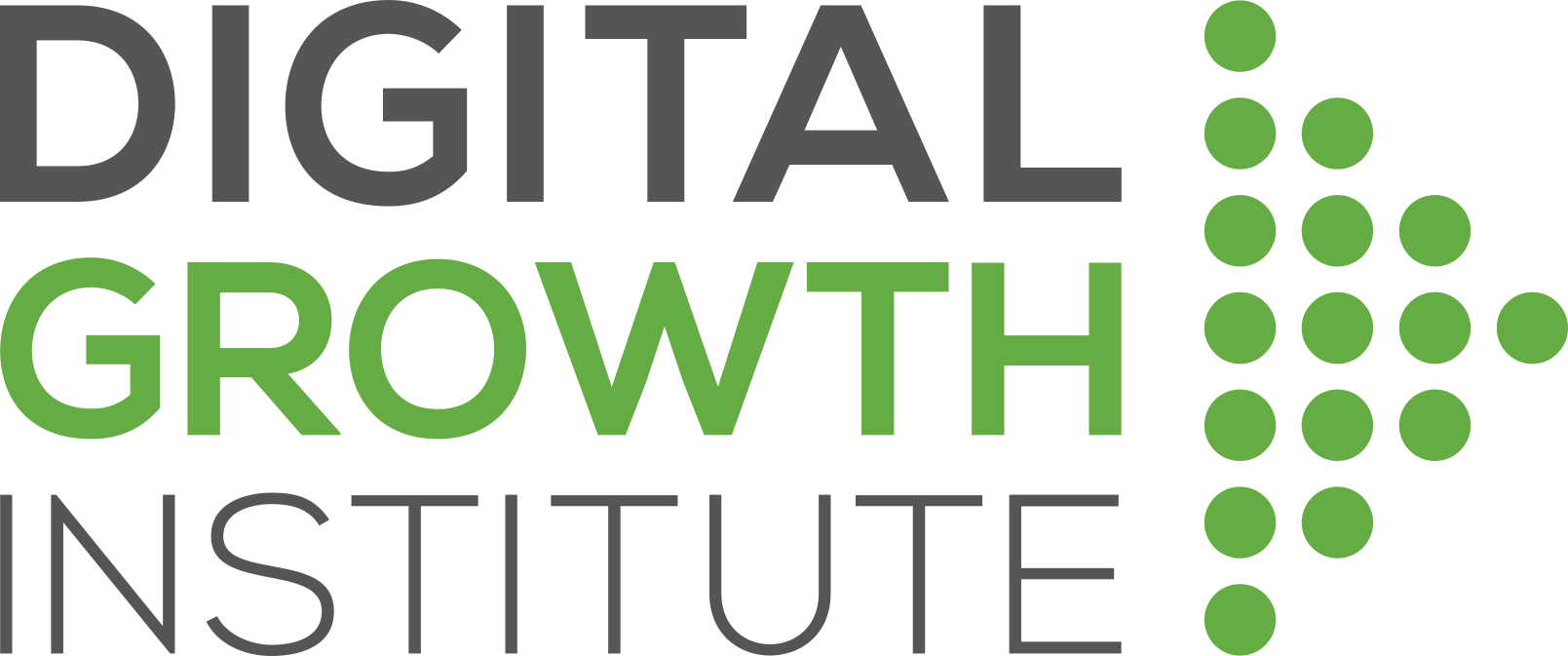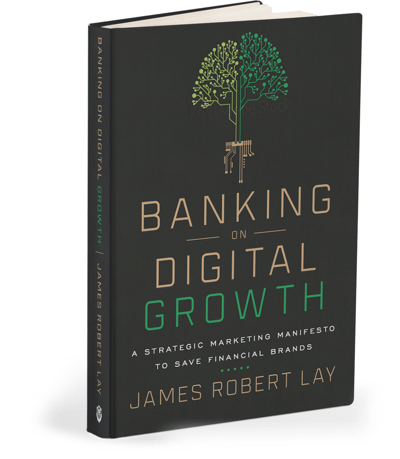As digital continues to change the marketing and sales landscape at an exponential pace, particularly in regards to consumer behavior and competitive threats, there is an exponential increase in complexity associated with the rise of technology that has many of us working as if we are stuck in the “quicksand of change.”
Change and transformation (specifically for individuals and teams) are key trends I'm focused on for 2020 as I continue the lead the Digital Growth Institute on a mission to simplify digital marketing and sales strategies that empower financial brands to generate 10X more loans and deposits.
I get it.
Digital growth can feel overwhelming for any financial brand marketing, sales, and leadership team.
Table of Contents:
- Are You Dabbling in Digital?
- Stop Doing Digital Marketing to Maximize Your Digital Growth Potential
- Become Aware of the Overwhelm Caused by Exponential change
- Protect Your Time to Protect Yourself
- Commit to Progress, Not Perfection
- Always Ask Who Before How
- Eliminate Fear and Create New Realities for Yourself and Your Team
- Create a Bigger, Better, and Brighter Future for the People in the Communities You Serve
1. Are You Dabbling in Digital?
Through our ongoing research, one of the biggest reasons financial brand teams report feeling confused, frustrated, and overwhelmed about digital growth is because they are simply dabbling in digital.
What about you?
Are you guilty of dabbling in digital?
There are six easy ways to find out:
1. You recently built a new website (or are thinking about building one in the next year) that is mobile responsive and ADA compliant. However, in reality, your new website is still nothing more than a glorified online brochure -- not a lead generation engine -- as it lacks key strategic conversion points (there are three of them) and your website has never been secret shopped like your physical branches have.
2. You have placed or are placing digital ads on Google or Facebook but you can't prove what's working and what's not beyond clicks on calls to action (if that).
3. You are blasting out emails but lack an email automation methodology that nurtures and guides three different types of digital leads coming in from your website through individualized buying journeys for each one of your key product lines.
4. You are producing and promoting content like articles and videos on your blog and social media networks but you can't track anything beyond vanity metrics like clicks, comments, likes, shares, and follows.
5. You feel overwhelmed, confused, and frustrated about what to do next because you do not have a well defined digital growth strategy that builds courage and commitment from your team and other key stakeholders.
6. You lack ongoing team training that provides clarity into future growth opportunties while increasing your capability and confidence every 90 days.
Growth Action: Count up how many of the above statements you agree with. If you agree to one or more of these six points above then there is a strong possibility you might be a good fit for the Digital Growth Jumpstart or Accelerator Program.
2. Stop Doing Digital Marketing to Maximize Your Digital Growth Potential
The rush of a new year is always exciting.
New projects to work on.
New things to do.
We're all busy.
However, being busy doesn't equal success as there are four operating environments you can be working in:
- Learn: Gain clarity and insights into new growth opportunties
- Think: Strategize how to best move forward based on what you learned
- Do: Apply the thinking and strategy through implementation
- Review: Reflect on what you've done to find new ways to do it even better
However, financial brands get stuck dabbling in digital, their marketing and sales teams are so focused on the "doing" they simply don’t have time to learn, think, or review.
This is why I challenge you to make 2020 the year you and your financial brand stop "doing digital marketing" once and for all.
I recently shared insights in this Financial Brand article I wrote about five ways financial marketing, sales, and leadership teams can avoid the "quicksand of digital change" and stop getting stuck "doing digital marketing."
I've further expanded on these thoughts below to help you make 2020 your best year ever.
Growth Action: Print the following five commitments and related actions to place on your desk and then review them as you make progress throughout the year.
3. Become Aware of the Overwhelm Caused by Exponential change
Harvard professors Robert Kegan and Lisa Lahey share in their book, Immunity to Change, how the increase in complexity associated with the rise of technology has many of us working as if we are stuck in the “quicksand of change.”
The interesting thing to note about quicksand is the harder you fight and struggle, the more you get stuck and feel overwhelmed.
And that’s the case for many financial marketers right now because the complexity of marketing strategies has far surpassed the “complexity of our mind,” or our ability to handle and cope with exponential changes.
Let me be very clear.
This has nothing to do with who smart we are.
Being able to handle and adapt to changes is not about intelligence but instead about how we make sense of the world around us, our environment, and the way we operate within it.
It is for this reason we are in the very early stages of starting to measure and quantify the Adaptability Quotient (AQ) of marketing teams. I hypothesize training and elevating the AQ of financial brand marketing, sales, and leadership teams is a true strategic competitive advantage in today’s ever-changing digital world.
When you adapt to change you will modify your behavior and actions. This requires you to take on new responsibilities and gain new capabilities.
If you do this, without letting go of the actives of the past that no longer create value for you or your financial brand, you will constantly feel frustrated and overwhelmed.
Growth Action: Identify one (or two or three) things you will stop doing this year and then stop doing them to create more space and time for you to learn new insights, think through strategy, and optimize your marketing and sales to do them even better.
Stop, pause, and think as you ask yourself, “What is one thing I'm doing right now that is out of habit or comfort but no longer creates value?" The quicker you root out these non-value creating activities the faster you will take back your time.
4. Protect Your Time to Protect Yourself and Ensure You Make Progress
Time is the great equalizer.
There are only 24 hours in a day or 168 hours in a week.
Dan Sullivan’s Entrepreneurial Time System®, that structures time into three very different kinds of days, has forever transformed my thinking and perspective when it comes to time management.
Before implementing Dan's Entrepreneurial Time System®, I lived in a constant state of chaos. Yes... I was busy all the time but I never felt like I made any real progress at all.
That's why I recommend blocking your calendar and your time before your calendar and time become blocked and booked by someone else. Consider the following four types of days when planning out your week:
Growth Days: These are the days you get deep work done and maximize your growth potential as you eliminate any and all distractions (email, meetings, phone calls, text messages) that can pull you out of that deep work.
Sometimes it helps to work offsite during Growth Days to gain an entirely new environment that eliminates all distractions, encourages deeper focus, and enhances creative or critical thinking. You might also find time to learn and gain new insights during your Growth Days.
Me Days: Just as important as Growth Days, Me Days are the days you put your oxygen mask on first to take care of you. You recharge your phone to maximize its performance and you must also do the same for you to maximize your personal performance.
Me Days mean no work as you rest and recharge your mind which is your most important tool and asset in today's digital world. That means no checking emails, reading industry trade journals or business books, or listening to business-related podcasts.
Digital Detox Days: Think of these days as a Me Day with a huge upgrade as you eliminate any and all digital tools from your life for 24 hours. This means no email, social media, browsing the internet, watching videos on YouTube, Netflix, etc.
You can still use a mobile phone to communicate (texting is a bit of gray area... phone calls are better). Turn your smart phone into a dumb phone. Uninstall and block all social, email, and web browsers from your mobile device.
Give yourself a lot of grace if you struggle here and find an accountability partner because Digital Detox Days are hard at first.
The vast majority of us are addicted to our digital devices. And the first path towards growth in this area is admitting we have a problem. I get it as I've been here before and I encourage you to fight the good fight as the personal growth you gain is huge when you eliminate all of the digital distractions in your life for at least 24 hours.
While it is a bit of a paradox, this is an area I continue to study more and more to empower financial brand marketing, sales, and leadership teams to truly maximize their performance and digital growth potential.
Bumper Days: These are the days you get fully prepared for your Growth Days, Me Days, or Digital Detox Days as you work through emails, take meetings and schedule calls. One of the biggest challenges I see for many financial brand marketing, sales, and leadership teams is they spend 95% of their time stuck in Bumper Days, never getting any real work done, and as a result, battling overwhelm and the “quicksand of change.”
Growth Action: Block your calendar into these four types of days over the next 90 days. Keep a journal about how it feels to work and think within these four types of environments.
5. Commit to a Life of Progress, Not Perfectionism
Hi, my name is James Robert Lay and I'm a recovering perfectionist.
Perfection is the enemy of progress and growth. That is why it is your job to root out perfectionism, both within yourself and within your team, as perfectionism carries an extremely high cost in today's fast-paced digital world.
Give yourself permission to not be perfect as you focus primarily on the first 80% of whatever you are working on and then launch it. Because once you launch something, you can test it, learn from it, and then optimize it to make it even that much better.
Rapid iteration (and dare I even say failure), not perfectionism, is how you move forward, make progress, and maximize your future digital growth potential.
Growth Action: Carve out time at the end of each month to reflect on the progress you've over the previous 30 days. Celebrate your wins and identify one action you can take over the next 30 days to make a marketing process or system even that much better.
Bonus: The video below from Seth Godin speaks to this point well about how we all can quite the lizard brain that threatens to hold us all back.
6. Always Ask Who Before How
What got you to where you are today will not get you to where you need to go tomorrow.
There are countless new projects and activities to do for a financial brand to maximize their future digital growth potential.
The biggest complaint I hear from financial brand marketing, sales, and leadership teams when starting these new projects or establishing new habits is, "How am I ever going to do this? How will I ever get this done with so much on my plate already?"
Good news! The solution to this great problem is simple.
- Accept you don't have to know it all and for sure you don't have to do it all as there are so many different areas of expertise required for digital growth.
- Stop holding on so tightly to the activities or actions you know you need to delegate or eliminate.
I'm willing to bet you are doing "work" right now you should not be doing all for a variety of reasons.
This includes "work" that:
- No longer creates value and you continue to do it because you've become so accustomed to it that the habit of this "work" is ingrained in you. This "work" might even bring you comfort as it no longer challenges or pushes you but keeps you busy.
- Drains both your time and energy keeping you from focusing on the things that create the greatest value.
Start every new project or activity by asking, "Who do I need to find to help me accomplish X, Y, or Z?"
This idea of "who not how" is a concept Dan Sullivan and Benjamin Hardy are working together on for their upcoming book. In the meantime, I highly recommend the podcast they host together as there is a whole world full of resources available for you to bridge capability or capacity gaps to ensure you are working within the areas of your own personal expertise to create value.
Growth Action: Identify the "work" you need to eliminate or delegate as noted in points 1 and 2 above. Then, stop doing work that no longer creates value. Have the hard conversations you need to have with yourself or others so you create space and time to learn, strategize, and optimize. Next, look for someone who is far better at this "work" than you will ever be and actually enjoys it.
7. Eliminate Fear and Create New Realities for Yourself and Your Team
I have seen the enemy of my future growth and the enemy I see is me.
Take a good look at yourself in the mirror every single morning. Gaze deep into those eyes staring right back at you. Who do you see? What do you see?
More often than not we are what stands in the way of maximizing our future growth potential because of four fears.
1. Fear of the unknown
2. Fear of change
3. Fear of failure
4. Fear of success
Our future growth is a battle that is fought and won on the battlefield of our mind and how we manage, deal with, and adapt our behaviors in response to rapid change.
Think about that word for a moment: Change
No one likes to change. I know I don't. I much prefer the safe routine that fears comfortable and secure. But that comfort and security leads to complacency.
Change is hard.
Change is painful.
It is no wonder the word "change" is often loaded with negative feelings and emotions.
However, growth can only come through the pain of change.
Growth Action: Help others create new realities -- along with a bigger, better, and brighter future -- as you begin to speak not of change, but of transformation and growth.
Going forward, think of fear this way:
- False
- Evidence
- Appearing
- Real
The fears we fight are more often than not an illusion in our own minds.
You can ease the pain of rapid change for others simply by committing to stop using the word "change" at your financial brand. When you say something needs to change, change will be fought by people at the subconscious level as people tend to create their own reality of what change means based on their own personal experiences.
8. Create a Bigger, Better, and Brighter Future for the People in the Communities You Serve
As we enter 2020 the economy is still strong, the unemployment rate is down and inflation is very low.
However, money is getting more stressful for people.
The numbers don't lie as according to the National Financial Capability Study:
- More than half of Americans (53%) agree that “thinking about my personal finances can make me feel anxious.”
- As many as 44% of Americans agreed that “discussing my finances can make my heart race or make me feel stressed.”
- A whopping 63% of millennials, defined as those 18 to 34 years old, said they are financially anxious, and 55% feel stressed.
- Women, as well, are a lot more financially anxious than men; 57% of women said they felt financially anxious, versus 47% of men. And 49% of women feel stressed when discussing their finances, versus 38% of men.
This financial stress is taking a toll on people's health, relationships, and overall sense of well being. They are looking for someone they can trust to guide them beyond their questions and concerns towards a bigger, better, and brighter future.
They are looking for you.
They are looking for your financial brand.
Growth Action: Put people, along with their financial stress and pain, at the center of all of your thinking around digital growth strategy and I guarantee you will maximize your future digital growth potential in the decade to come.
This article was originally published on January 7, 2020. All content © 2024 by Digital Growth Institute and may not be reproduced by any means without permission.





